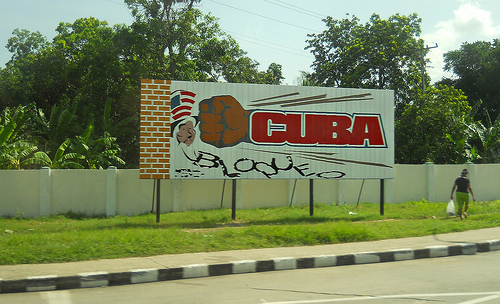Cuban bloggers inside and outside of the island have held a form of protest this week through posts in which they report their experiences on the economic embargo of the United States against Cuba that has lasted half a century.
The embargo is “inside or outside Cuba, beyond the Mediterranean and also in the Caribbean.” With these words, the Cuban blogger Sandra Álvarez, author of the Negra cubana tenía que ser [1][es] blog, finishes a post [2][es] dedicated to her neighbour Mayra, a Cuban resident, for whom the embargo imposed on Cuba by the United States government is “a tremendous lie, an exaggeration.”
Álvarez, who currently lives in Hanover, Germany, recalls her experience in October 2011 in Costa Rica, when a bank employee prevented her from receiving a payment because her passport was not listed “among the possible options to select.”
According to the author, the bank employee, after having made several calls, confirmed that she could only proceed with the payment if the money was in the name of a person who was not Cuban. “Western Union is an American company and because of the embargo, your country is not here, your passport cannot be used to withdraw that money even though it's in your name.”
La isla rebelde [The Rebellious Island] [4][es] confirms [5]the extraterritorial character of the economic sanctions and alludes to the recent fine [6] imposed on the Italian bank Intensa Sanpaolo for transferring 1,643,326 dollars between 2004 and 2008 in 53 transactions processed to Cuba.
Arthur González, author of the blog, points out that this development unearths the proposal of the subsecretary of State Lester Mallory in April 1960, published in the U.S Department of State book “Foreign Relations USA”, that established that “any conceivable method must be promptly utilised to weaken the economic life of Cuba. Denying money and supplies to Cuba to diminish the real and monetary wages, in order to bring about hunger, desperation, and the overthrow of the government.”
However, other bloggers, like Harold Cárdenas, one of the authors of La Joven Cuba [7][es], say that the there is also an “internal embargo” that “is expressed through obsolete prohibitions and points of view, that in recent years seems to be breaking down, but continues to be supported by a bureaucracy that tries to resist or distort the necessary changes.”
For Cárdenas:
Una forma de expresión del bloqueo interno ha sido utilizar a menudo la política de los Estados Unidos hacia Cuba como pretexto para justificar nuestras propias insuficiencias, la mala administración no puede achacarse solo a los condicionamientos externos, mucho tenemos de culpa nosotros mismos pero el chivo expiatorio sigue utilizándose. Lo peor de esto resulta en que al convertir el bloqueo norteamericano en fetiche se provoca que la gente lo ignore, lo descarte y lo olvide, bonito favor a los yanquis.
One form of expression of the internal embargo has been to frequently utilise the United States’ policy towards Cuba as a pretext to justify our own shortcomings. Deficient administration cannot be attributed solely to external conditions, we have a lot to blame ourselves for, but a scapegoat is still being used. The worst of this is that by making the North American embargo a fetish, it causes people to ignore it, dismiss it, and forget it, a nice favour for the Yankees.
His post, entitled La isla de los dos bloqueos (The Island of the Two Embargoes) [8][es], was republished [9] on the blog Aló presidenta do Brasil [10] [pt].
The Facebook group Cuban Americans for Engagement [11] published [12][es] the request that Kim Ng, the Major League Baseball's (MLB) Vice President for Operations, made to Juan Francisco Puello, of the Caribbean Confederation, on 15th of July, to nullify Cuba's return to the Caribbean Series, from which they have been absent since 1960.
If Cuba returns to the next season of the Caribbean series, the Mexican and Venezuelan leagues would have to play without baseball players who belong to the Major League Baseball (MLB), the main source of supply of circuit players, the Dominican Diario Libre [13][es] [daily newspaper] published.
According to Cuban Americans for Engagement [11],
Resulta que cuando Cuba toma un paso positivo para acceder al profesionalismo y a un sistema más cercano al mercado en el beisbol, del otro lado quieren cerrar la puerta. A propósito, ¿no dicen los partidarios del embargo, que no hay bloqueo, que lo que defienden solo afecta a las relaciones con EE.UU?
It appears that when Cuba takes a positive step to accede to professionalism and a system closer to the baseball market, on the other hand they want to close the door. Speaking of which, don't the supporters of the embargo say that there is no embargo, that what they defend only concerns the relationship with the USA?
The tensions between the United States and Cuba affect the lives of millions of Cuban families. For the author of the blog La mariposa cubana [14] [es], there are embargoes that destroy families, memories… and lives, lost just 90 miles away.
